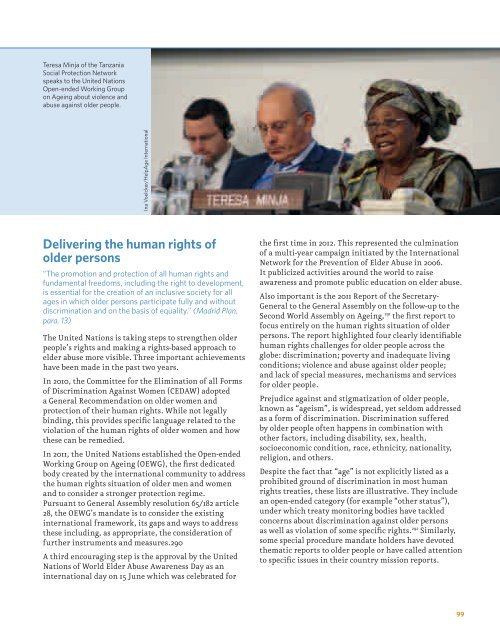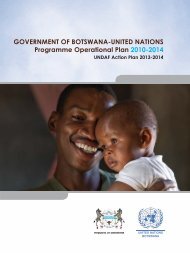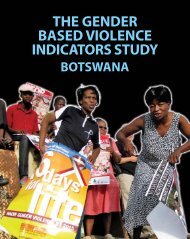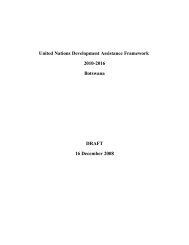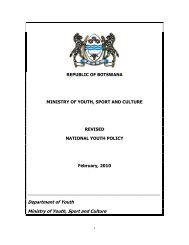Ageing in the Twenty-First Century: - HelpAge International
Ageing in the Twenty-First Century: - HelpAge International
Ageing in the Twenty-First Century: - HelpAge International
You also want an ePaper? Increase the reach of your titles
YUMPU automatically turns print PDFs into web optimized ePapers that Google loves.
Teresa M<strong>in</strong>ja of <strong>the</strong> Tanzania<br />
Social Protection Network<br />
speaks to <strong>the</strong> United Nations<br />
Open-ended Work<strong>in</strong>g Group<br />
on <strong>Age<strong>in</strong>g</strong> about violence and<br />
abuse aga<strong>in</strong>st older people.<br />
Ina Voelcker/<strong>HelpAge</strong> <strong>International</strong><br />
Deliver<strong>in</strong>g <strong>the</strong> human rights of<br />
older persons<br />
“The promotion and protection of all human rights and<br />
fundamental freedoms, <strong>in</strong>clud<strong>in</strong>g <strong>the</strong> right to development,<br />
is essential for <strong>the</strong> creation of an <strong>in</strong>clusive society for all<br />
ages <strong>in</strong> which older persons participate fully and without<br />
discrim<strong>in</strong>ation and on <strong>the</strong> basis of equality.” (Madrid Plan,<br />
para. 13)<br />
The United Nations is tak<strong>in</strong>g steps to streng<strong>the</strong>n older<br />
people’s rights and mak<strong>in</strong>g a rights-based approach to<br />
elder abuse more visible. Three important achievements<br />
have been made <strong>in</strong> <strong>the</strong> past two years.<br />
In 2010, <strong>the</strong> Committee for <strong>the</strong> Elim<strong>in</strong>ation of all Forms<br />
of Discrim<strong>in</strong>ation Aga<strong>in</strong>st Women (CEDAW) adopted<br />
a General Recommendation on older women and<br />
protection of <strong>the</strong>ir human rights. While not legally<br />
b<strong>in</strong>d<strong>in</strong>g, this provides specific language related to <strong>the</strong><br />
violation of <strong>the</strong> human rights of older women and how<br />
<strong>the</strong>se can be remedied.<br />
In 2011, <strong>the</strong> United Nations established <strong>the</strong> Open-ended<br />
Work<strong>in</strong>g Group on <strong>Age<strong>in</strong>g</strong> (OEWG), <strong>the</strong> first dedicated<br />
body created by <strong>the</strong> <strong>in</strong>ternational community to address<br />
<strong>the</strong> human rights situation of older men and women<br />
and to consider a stronger protection regime.<br />
Pursuant to General Assembly resolution 65/182 article<br />
28, <strong>the</strong> OEWG’s mandate is to consider <strong>the</strong> exist<strong>in</strong>g<br />
<strong>in</strong>ternational framework, its gaps and ways to address<br />
<strong>the</strong>se <strong>in</strong>clud<strong>in</strong>g, as appropriate, <strong>the</strong> consideration of<br />
fur<strong>the</strong>r <strong>in</strong>struments and measures.290<br />
A third encourag<strong>in</strong>g step is <strong>the</strong> approval by <strong>the</strong> United<br />
Nations of World Elder Abuse Awareness Day as an<br />
<strong>in</strong>ternational day on 15 June which was celebrated for<br />
<strong>the</strong> first time <strong>in</strong> 2012. This represented <strong>the</strong> culm<strong>in</strong>ation<br />
of a multi-year campaign <strong>in</strong>itiated by <strong>the</strong> <strong>International</strong><br />
Network for <strong>the</strong> Prevention of Elder Abuse <strong>in</strong> 2006.<br />
It publicized activities around <strong>the</strong> world to raise<br />
awareness and promote public education on elder abuse.<br />
Also important is <strong>the</strong> 2011 Report of <strong>the</strong> Secretary-<br />
General to <strong>the</strong> General Assembly on <strong>the</strong> follow-up to <strong>the</strong><br />
Second World Assembly on <strong>Age<strong>in</strong>g</strong>, 291 <strong>the</strong> first report to<br />
focus entirely on <strong>the</strong> human rights situation of older<br />
persons. The report highlighted four clearly identifiable<br />
human rights challenges for older people across <strong>the</strong><br />
globe: discrim<strong>in</strong>ation; poverty and <strong>in</strong>adequate liv<strong>in</strong>g<br />
conditions; violence and abuse aga<strong>in</strong>st older people;<br />
and lack of special measures, mechanisms and services<br />
for older people.<br />
Prejudice aga<strong>in</strong>st and stigmatization of older people,<br />
known as “ageism”, is widespread, yet seldom addressed<br />
as a form of discrim<strong>in</strong>ation. Discrim<strong>in</strong>ation suffered<br />
by older people often happens <strong>in</strong> comb<strong>in</strong>ation with<br />
o<strong>the</strong>r factors, <strong>in</strong>clud<strong>in</strong>g disability, sex, health,<br />
socioeconomic condition, race, ethnicity, nationality,<br />
religion, and o<strong>the</strong>rs.<br />
Despite <strong>the</strong> fact that “age” is not explicitly listed as a<br />
prohibited ground of discrim<strong>in</strong>ation <strong>in</strong> most human<br />
rights treaties, <strong>the</strong>se lists are illustrative. They <strong>in</strong>clude<br />
an open-ended category (for example “o<strong>the</strong>r status”),<br />
under which treaty monitor<strong>in</strong>g bodies have tackled<br />
concerns about discrim<strong>in</strong>ation aga<strong>in</strong>st older persons<br />
as well as violation of some specific rights. 292 Similarly,<br />
some special procedure mandate holders have devoted<br />
<strong>the</strong>matic reports to older people or have called attention<br />
to specific issues <strong>in</strong> <strong>the</strong>ir country mission reports.<br />
99


